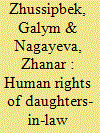| Srl | Item |
| 1 |
ID:
189949


|
|
|
|
|
| Summary/Abstract |
Human beings come from various backgrounds shaped by their norms, culture, belief systems, age, social orientation and their language. In addition to all these human beings, the common denominator is that they are different in terms of their parity and equality. This difference of human beings in the world has their own knowledge and cultural practices towards contribution of knowledge. Transformation of leadership which is imperative during the decolonialisation projects demands among other things more information about African traditional leadership. The realisation and existence of such leadership cannot be imagined without the indigenous knowledge which was and is still rich with ingredients of growing and leading African people to the right direction. Our South African context demands that women must also be uplifted to leadership roles in society and the workplace, but this usually collides with different African beliefs that still put women secondary to men, for instance, the issue of taboos which mainly promote the subjection of women. For the sake of this research, the focus is on those taboos which portray women as inferior to men in the society. Two cultures were selected for this purpose, Xitsonga and IsiZulu.
|
|
|
|
|
|
|
|
|
|
|
|
|
|
|
|
| 2 |
ID:
178471


|
|
|
|
|
| Summary/Abstract |
The familial position and social status of daughters-in-law (kelins) in ‘traditional’ Central Asian families can be characterized as low, subservient and marginalized. By adopting normative human rights discourse, this paper argues that it is an example of the relativist challenge of cultural authenticity towards the universality of human rights, specifically women’s human rights. By using participant observation which can also be qualified as experiential research, serial in-depth and informal interviews, and an analysis of posts published in social media, the forces driving the persistence of a relativist approach to kelins’ human rights such as retraditionalization, the revival of conservative Islam, an unawareness of the human rights and the patterns of authority-subordination are explored. Through a conceptual framework combining Iris Young’s concept of the ‘five faces of oppression’ and the notion of ‘harmful traditional practices’, elaborated by international human rights documents, the study conceptualizes the family position and social status of the kelins as one of structural oppression or systemic injustice, created and legitimized by informal, harmful traditional norms and practices.
|
|
|
|
|
|
|
|
|
|
|
|
|
|
|
|
| 3 |
ID:
144410


|
|
|
|
|
| Summary/Abstract |
Students across South Africa have united not just to demand the end to rising university fees or the toppling of a statue but also to reject the ruling party’s liberal capitalist project. T.O. Molefe follows the countrywide student protests and analyzes the effectiveness of the theories undergirding the ongoing youth movement.
|
|
|
|
|
|
|
|
|
|
|
|
|
|
|
|
| 4 |
ID:
065125


|
|
|